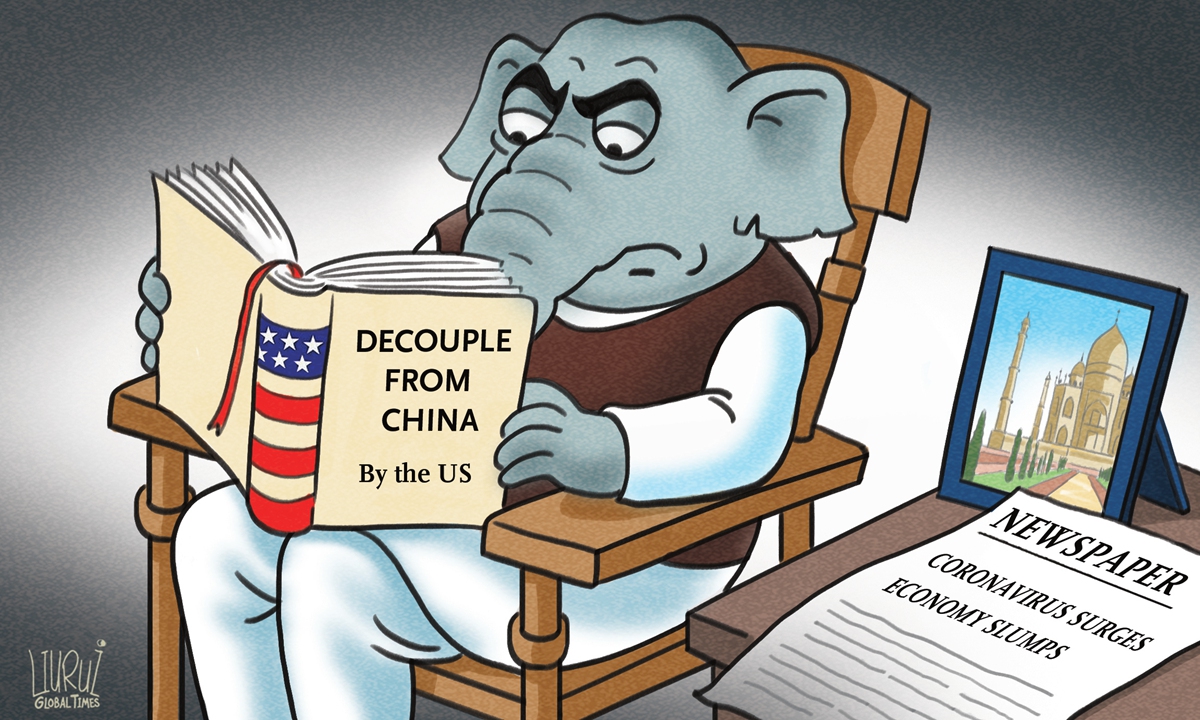 By Xie Chao Source (Global Times, 23 August 2020) – The China-India border issue tends to incite nationalist sentiments in both countries whenever a standoff is reported. Compared to Chinese scholars who are suggesting means of negotiations in a calm and objective manner, their Indian counterparts are competing to propose hard-line approaches. It is common for Indian scholars to express anti-China rhetoric to cater to public sentiment, whose anti-China standpoint has become a new form of political correctness in India.
By Xie Chao Source (Global Times, 23 August 2020) – The China-India border issue tends to incite nationalist sentiments in both countries whenever a standoff is reported. Compared to Chinese scholars who are suggesting means of negotiations in a calm and objective manner, their Indian counterparts are competing to propose hard-line approaches. It is common for Indian scholars to express anti-China rhetoric to cater to public sentiment, whose anti-China standpoint has become a new form of political correctness in India.
With a prevailing political correctness on China policy, little attention is given to whether such suggestions are feasible or in India’s genuine national interests. A recent article in Hindustan Times titled “India must inflict costs on China” by Brahma Chellaney, an Indian geostrategist, is a typical example of such rhetoric. Brahma has abundant experiences in India’s foreign policy, but his analysis in the article shows nothing but prejudice against China and his suggestions on how India can inflict costs on China and how such costs can subdue China can hardly reflect his accumulated knowledge.
Brahma claimed that “India has the world’s most-experienced army in hybrid mountain warfare. Contrary to the conventional wisdom that China holds a significant military advantage, several recent international assessments underscore that India’s air and ground forces have a qualitative edge over the People’s Liberation Army.” While it is politically correct to claim so as an Indian scholar, his claim is also difficult to verify or falsify since only real war can answer it. Let’s pray we don’t see war again between the two, and before that, some analysis with obvious logic and clear evidence can be done on the costs inflicted on both sides.
The history has proven that both countries are determined to inflict harm to the other side in case of border tensions, and the stalemate in the Galwan Valley has long led both into a race of attrition. The situation at the site indicates that the standoff might continue into the winter. Unlike a smaller Chinese army presence along the border, India has kept a large army force even during peace time, and even more troops were sent in after the standoff. Maintaining troops in extremely cold and high-altitude regions means extreme consumption of resources. We shouldn’t doubt the determination of Indian government to tolerate the costs, but when it comes to the actual costs by the standoff, it is inflicting much larger costs to itself.
Brahma suggested that India must impose economic and diplomatic costs on China. A basic fact should be made clear that on economic front, China has more means to sanction India as retaliation, but China didn’t want to use them. The obvious reason is that economic sanctions are double-edged tools, and the moment that India takes to sanction or seek decoupling, it is inflicting costs on itself and hurting its own economy.
What Brahma didn’t mention in his article is that he was not expecting India can subdue China on economic front but it can take advantage of current US-China trade war, even the words of economic sanction and decoupling were borrowed from there as the US is imposing sanctions on China and pushing for China-US decoupling. If he really believes so, such a view is shortsighted and full of prejudice. You can’t reject clear evidences on worsening US economy and the rapid recovery of the Chinese economy, and the US as a hegemon is also inflicting larger costs on itself when entering into a trade war.
On diplomatic front, Brahma suggested India must launch an offensive against China on the Taiwan question and again he was suggesting a recent trip by US health secretary to Taiwan island that India should change its stand on the one-China policy. He also suggested that Indian prime minister meet the the Dalai Lama. Such policy advice is self-contrary, since you can’t claim China as an aggressive expansionist, as the claim goes, is taking foreign land and at the same time, as a coward, can’t defend its own national unity.
On the matter of safeguarding national unity, China and India have shared interests. What Chinese people think of Brahma’s suggestion here is what Indian people hears when a Chinese scholar openly promotes an intervention on insurgencies in Northeast India, or urges the Chinese leader to receive exile Khalistan separatists. We share similar pains, and what Brahma was suggesting was nothing but emotion venting, devoid of any considerations for safeguarding India’s national interests.
As for India’s China policy, it is rare to find Indian scholars who can speak Chinese, understand Chinese culture and can communicate with their Chinese counterparts. The political correctness on anti-China positions is further suffocating dissenting ideas and on many issues, scholars will conveniently turn themselves into China experts, while not having a genuine understanding of China. Some of them even don’t bother to travel to China and their perceptions on China stop at imagination.
The author is an assistant professor at the Institute for International and Area Studies, Tsinghua University. [email protected]

